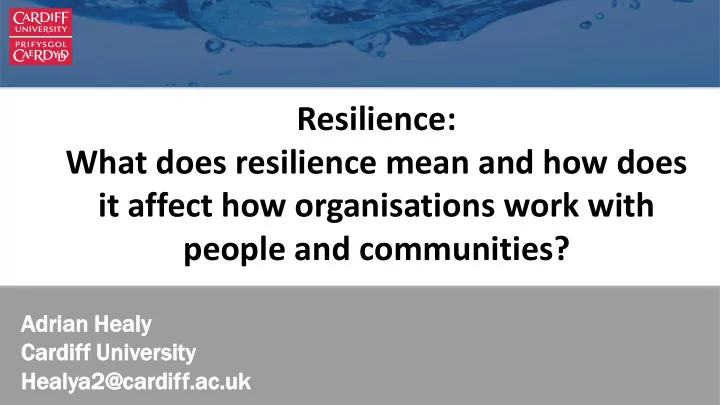

Resilience: What does resilience mean and how does it affect how organisations work with people and communities? Ad Adrian an Healy Cardif iff f Univer ersit sity Healya2@c 2@cardif ardiff.ac.uk .ac.uk
Various contexts http://africasacountry.com Wikipedia.com Source: Rough Guides Economic Resilience of regions Resilience of cities Community resilience to economic shocks Resilience of communities in the face of water crises
Coverage • What resilience means in different contexts – The environment, Economy and Community • The difference between individual, collective and organisational resilience. • The implications for the ways in which public sector organisations work in influencing choices and behaviour.
Resilience • Increasingly popular UN Sustainable Development Goals Well-being and Future • But used in a variety of Generations Act ways Economic Action Plan • Risk of being too ‘fuzzy’?
“A resilient Wales” • A nation which maintains and enhances a biodiverse natural environment with healthy functioning ecosystems that support social, economic and ecological resilience and the capacity to adapt to change (for example climate change)
• A prosperous Wales, a resilient Wales, a healthier Wales • To build resilient communities • A strong, resilient and diverse economy • Building resilience to the impacts of climate change • Improve the resilience of local businesses • Resilient energy networks • Develop the resilience , skills, enthusiasm and creativity (individuals) will need to adapt to the changing world of work • Improve the resilience of our economy, communities and the environment
SDGs and a change in emphasis • Resilient Infrastructure • Emphasis on anticipatory action in building • Resilience of the poor resilience • Resilience of the • Reflects a broader shift away from the idea of vulnerable managing disasters and • Resilient social systems towards the idea of • Resilient eco-systems managing risk
Introducing resilience To bounce back “The greatest glory in living lies not in never falling, but in rising every time we fall ” Nelson Mandela To return to the original state Photo credit: Blogspot.com
Adapting and transforming • Not enough to (simply) withstand a shock or return to an original state, the challenge is to adapt to new circumstances……to transform Why? • Because you need to be ready for the next shock • Simply coping and surviving is not enough (asset depletion)
Resilience in different contexts • Environmental resilience – ‘Building resilience to the impacts of climate change’ – Mitigation and adaptation – Sustaining biodiversity and ecosystem services • Economic resilience – Maintaining employment, incomes or GVA over time – Sustaining a diverse economy
Community Resilience • Ability of communities to withstand shocks • To anticipate risks and limit impacts • To cope better themselves (reduce demands on others) – Seen as a positive or as abandonment?
But here are some questions Resilience of what to what……….. • Resilience for whom and where? – Are there trade-offs? • Resilience by when? • Can we construct resilience? – Innate factors vs choices and behaviour • Concepts of negotiated resilience? • What do individuals feel about their own circumstances? • Is resilience always good?
Who’s there to help? Base in brackets. Confidence Interval ±3% at 95% confidence
Coping strategies in the face of an (economic) shock Base in brackets. Confidence Interval ±3% at 95% confidence
Differences between individual, collective and organisational resilience Individual resilience Collective resilience • Own resources, own • Collective resources, shared choices activities/responsibility, trust • Limited asset base • Greater asset base • Reaches a limit depending • Social capital on capitals available • Distributional dimensions begin • Potential negative to emerge spillover effects • What scale are we speaking of?
and what of Organisations? • The resilience of an organisation – Ability to respond to a shock/changing circumstances (adaptive capacity again) – Lessons from Great East Japan Earthquake – How does a Local Authority (for example) deal with a shock – Risks of unintended consequences (Cape Town Water Supply) • Organisations and resilience – ie how do organisations support resilience of others
Implications for how public services work • The role of public services – Coping strategies vs transformation • Direct action vs enabling actions of others – Facilitators and enablers vs leaders? • Collective actions towards shared goals • Seeing/setting organisational goals in a wider context (wellbeing/sustainable livelihoods…..) – New metrics?
Grenfell Tower “There’s no -one here to co-ordinate ” “There’s no - one giving us information” “It’s just the charities. Where are the government officials, where are the council officials?” All quotes from BBC (Rannard, G. and Eggert , N. 17 June 2017 London fire: Relative cites ‘lack of coordination’ in response)
New roles or old wine? • Are we just adding the There is still a long way to go word resilient to what to promote greater we already do….? understanding of resilience • What is different about as an outcome rather than as a set of activities or what we’re trying to outputs. (ODI, 2016) achieve….?
Resilience as outcomes • Valuing diversity • Supporting adaptive capacities • Strengthening assets and capitals • Challenging – as may not lead to the outcomes ‘we’ want
Recommend
More recommend